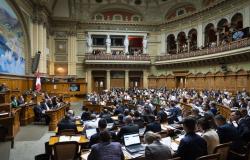Quebec, California and Washington State have reiterated their intention to link their carbon markets.
Published at 10:52 a.m.
Updated at 12:34 p.m.
Stephane Blais
The Canadian Press
On Monday morning, the Ministry of the Environment, Climate Change, Wildlife and Parks issued a press release to inform the public of the progress made in establishing a joint carbon market with California and Washington State, also known as a “liaison.”
“We believe that a liaison will strengthen our respective efforts to combat climate change and reduce air pollution, while encouraging other governments to adopt flexible, market-based climate policies. We will continue to share information and collaborate to establish a liaison and achieve these shared goals,” the statement reads.
In the spring of 2024, Quebec, California and Washington State had expressed interest in the possible creation of a linked carbon market between the three states.
Like Quebec since 2013, California has been managing a cap-and-trade program for greenhouse gas emissions since 2012. These two markets were linked on 1er January 2014.
After Ontario’s withdrawal in 2018, the Quebec government has been looking for several years to integrate new players.
The statement released Monday morning notes that Washington state has “undertaken a rulemaking process” with the goal of aligning some cap-and-investment program rules with those in California and Quebec.
It is also noted that “several other legally required steps must still be completed by the State of Washington before a linkage agreement can be finalized and signed.”
For example, it is necessary to carry out “an assessment from the perspective of environmental justice, a final assessment of the linking criteria provided for by the Climate Commitment Act and a public consultation.
SPEED
Currently, the carbon market in which Quebec participates with California operates according to the rules of the Cap-and-Trade System for Emissions Allowances (SPEDE), also called the carbon exchange.
The SPEDE aims to reduce greenhouse gas (GHG) emissions in the two federal states: companies in the most polluting major sectors can purchase “units” at auction every three months, which are a kind of emission rights.
Year after year, the ceiling on authorised emissions decreases, which pushes up the price of units and encourages companies to reduce their emissions, or even to buy “units” in the other territory.
A more diversified market
The arrival of a third player “will make the market more diversified, more solid and probably more sustainable,” according to economist Charles Séguin.
The professor in the Department of Economics at UQAM added that “for market players, it can also provide more flexibility, and it can reduce some of the variations that would be due to phenomena specific to certain jurisdictions, such as political uncertainty, for example.”
Avoiding an overabundance of rights
Charles Séguin is part of the Advisory Committee on Climate Change, set up by the Legault government.
In a committee opinion published last August, the committee provided an analysis of the performance of the SPEDE at the request of the Minister of the Environment, Benoit Charette.
PHOTO HUGO-SÉBASTIEN AUBERT, LA PRESSE ARCHIVES
Benoit Charette, Minister of the Environment
“The SPEDE has succeeded in generating significant revenues for the fight against climate change and in establishing a price on carbon, partially reflecting the environmental cost of GHG emissions,” the opinion reads.
However, Charles Séguin wrote, “tightening up is essential to enable us to get the most out of this tool in this transitional context.”
The professor suggested in particular reducing the ceilings by 17 million emission units by 2030, because the market is currently in a situation of surplus emission rights.
When there is an overabundance of rights, it is difficult to reduce our GHG emissions sufficiently.
Quebec and California must therefore ensure “that they do not integrate a player who, precisely, comes with an overabundance of rights and who will prevent Quebec and California from achieving their objectives. But that does not seem to be the case,” explained Professor Séguin.







